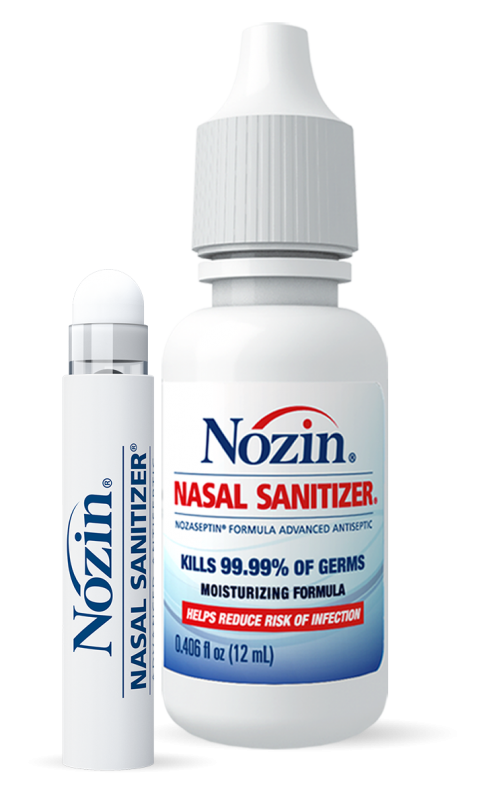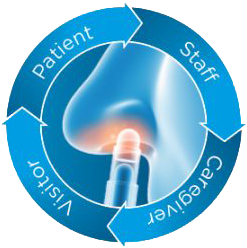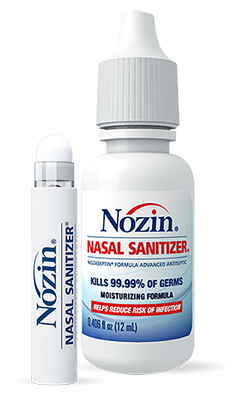FAQ: Frequently Asked Questions
Your Nozin advisor will partner with you to perform a site-specific analysis of your current environment.The resulting assessment can help identify areas of potential risk that could be addressed by Nozin programs. This can be followed by a review of costs, potential savings and further participation in discussions with your facility colleagues and decision makers.
Nozin advisors will fully support your implementation process with a step-by-step guide and will assist in creating high-impact clinical protocols outlining the use of the Nozin® Nasal Sanitizer® antiseptic. Learn more about Nozin programs here.
Yes. There are studies including peer-reviewed research and independently conducted studies. Qualified healthcare professionals may request assistance in there research and more information by clicking here
 Nozin® Nasal Sanitizer® is a non-prescription, broad spectrum antiseptic with demonstrated microbial killing activity when topically applied to the nares. The patented Nozin® Nasal Sanitizer® formula, Nozaseptin™, combines the safe, proven, antiseptic power of ethyl alcohol with the emollient, antioxidant benefits of natural oils.
Nozin® Nasal Sanitizer® is a non-prescription, broad spectrum antiseptic with demonstrated microbial killing activity when topically applied to the nares. The patented Nozin® Nasal Sanitizer® formula, Nozaseptin™, combines the safe, proven, antiseptic power of ethyl alcohol with the emollient, antioxidant benefits of natural oils.
In testing by independent FDA registered laboratories, Nozin® Nasal Sanitizer® was shown on application in vitro to kill 99.99+% of a broad spectrum of pathogenic organisms. Unlike an antibiotic, Nozin® Nasal Sanitizer® does not promote antibiotic resistance as it utilizes the non-selective antiseptic action of ethanol. It is well tolerated by users as it has a pleasant citrus scent and is highly moisturizing to the nasal opening.
Nozin® Nasal Sanitizer® is available in two presentations, the bottle and the POPSwab® ampule. To learn more about product information, ingredients and to view the drug facts click here.
Nozin Nasal Sanitizer® can be used throughout a healthcare facility and hospital to reduce nasal carriage, enhance hand hygiene efforts and lower the risk of nasal pathogen transmission.
A comprehensive implementation could include:
 Patient use:
Patient use:
- high risk areas such as Emergency Room and ICU
- pre and post procedure measures
- facility/hospital-wide
Staff use:
- care areas for patients with high susceptibility for infection such as oncology, transplant, NICU
- areas of potential high risk for staff acquisition, such as Emergency/Trauma, high contagion/pathogen burden
- facility/hospital-wide
Visitors use:
- facility/high risk areas
Learn about the 360™ Program and Professional Solutions your facility.
Healthcare workers (HCW) may be colonized with bacteria in the nares which in turn may be transferred to patients and other personnel. High risk areas like the ICU, ER and surgical floors would be recommended targets for the use of Nasal Sanitizer® to help reduce risk of infection.

As nose touching frequently compromises hand hygiene, Nasal Sanitizer® can be used to complement hand washing and hand sanitizer use. HCWs can regularly use Nasal Sanitizer® antiseptic as it gives them an extra layer of protection in addition to hand hygiene. The application is pleasant, moisturizing and, importantly, bacteria will not build antibiotic resistance to this non-antibiotic product.
Pregnant women should consult their physician regarding use of Nozin® Nasal Sanitizer®.
Yes. Nozin® Nasal Sanitizer® antiseptic is specifically formulated for regular daily use. The product is an over the counter (OTC) skin antiseptic. Ethanol, the active ingredient in Nasal Sanitizer®, has an established history of safe use and is classified as GRAE (generally recognized as effective) when used as directed.
It has been shown that alcohol-based topical antiseptics can be less irritating than soap and water and Nasal Sanitizer® antiseptic has been specifically shown to be safe in dermal toxicity and skin irritation studies.
Yes. A wealth of medical literature demonstrates that nasal carriage plays a major role in healthcare-associated infections (HAI) and surgical site infections (SSI) and that infection prevention protocols which include nasal decolonization can result in significant reductions in infection.
Nasal decolonization is a promising opportunity for infection control and remains under-utilized. Hand to nose contact occurs about every 4 minutes for everyone, often compromising hand hygiene and risking contamination. 80% of SSI pathogens’ DNA can be tracked to the patient’s own nose. On the basis of new reimbursement policies and significant recent studies, facilities and hospitals recognize the advantage of patient nasal carriage reduction programs. Research also indicates that including nasal hygiene for health care workers (HCW) may be beneficial.
Qualified healthcare professionals may click here to request additional research surrounding nasal decolonization.
Children under 12 years old should be supervised in use. A physician should be consulted for use on children under 2.
The cost of implementing varies by facility. Click here to receive a custom analysis and pricing for your facility.
Global Life Technologies Corp. owns all Nozin brand products including Nozin® Nasal Sanitizer® antiseptic. Global Life Technologies Corp. follows a mission to improve the quality of life for people by introducing unique and effective healthcare products based on innovative technologies.
Backed by over 15 years of research, supported by NIH grants, and successful clinical trials, Nozin products are designed to improve care, lower infection risk, and reduce healthcare costs.
Made in the USA, Nozin products are trusted in use by thousands of clinicians and infection control professionals.


